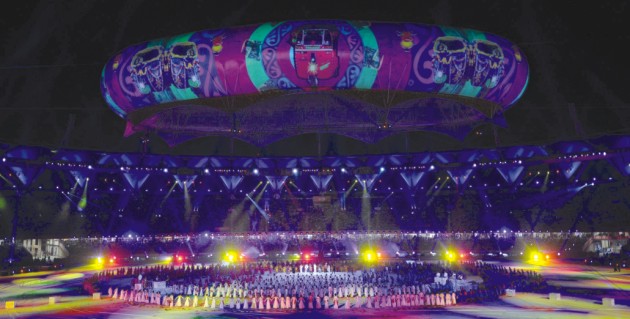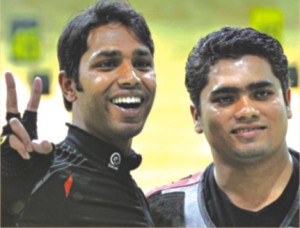|
Sport
For a Piece of Bronze
MOHAMMAD ISAM

Bangladesh has always floundered in international multi-sports events and it was no different at the 19th Commonwealth Games held in New Delhi this month. While smaller nations like Nauru, Cayman Islands and St Vincent and the Grenadines walking off with gold medals, the count has been diabolical to say the least.
If Asif Hossain Khan and Abdullah Hel Baki had an off day on October 5, the 79-member contingent would have to return empty-handed. But the duo finished with a bronze medal in the 10m air rifle pair event.
The pair only finished a point behind English duo of James Huckle and Kenny Parr, who won the silver with a total of 1174 points. The gold went to Indian pair Gagan Narang, a double world record holder and Olympic gold medallist Abhinav Bindra who soared above the competition with a tally of 1193.
It could have been expected that the other 34 athletes who traveled to the Indian capital would be inspired by the duo's medal-winning (be it the bronze) performance, but the whole fortnight has seen Bangladesh lurching from one disappointment to the other.
Even Asif and Baki couldn't be inspired. Both shooters were nowhere near the podium in the 10m air rifle individual event as they scored worse than their pair event.
The 2002 Commonwealth Games gold winner Asif however was thankfully brutal in judging his own display. He admitted that he has stuck to the same place as other shooters have gone to the next level, something that is beyond his reach. He wanted a coach good enough to guide him exclusively as the country's shooters are not technically equipped to fix their own problems.
 |
Asif Hossain Khan and Abdullah Hel Baki, winner of the only bronze medal in the 19th Commonwealth Games. |
“We have lacked quality coaches and there is no alternative to appointing a good coach if we want to fight against the world-class shooters,” he said a few hours after being eliminated from the individual event.
"Bindra challenged me in qualification of the 2002 Commonwealth Games and I beat him. But since then Bindra has improved, but I am still confined to a range between 588 and 594 scores," said Asif, apparently without a hint of remorse.
In women's shooting too, Bangladesh expected the sky. Their hopes faded away however when Sharmin Akhter Ratna and Sadia Sultana disappointed in the individual 10m air rifle event finals.
Ratna finished seventh in the eight-shooter field with a score of 494.7, seven point less than Singaporean gold medalist Xiang Wei Jasmine, who rewrote the Games record with a score of 398 out of 400. She then hit 103.7 in the shoot-off to finish on top with a total score of 501.7.
However, Ratna's teenaged compatriot Sadia did better than her for the first time to finish sixth through tie-break after the class nine student jointly finished fifth with famous Indian shooter Kavitha Yadav.
Apart from shooting though, Bangladesh took part in archery, athletics, boxing, swimming, weightlifting and squash.
The swimmer Shahjahan Ali Rony gave a ray of hope but soon got eliminated from the 50m breaststroke semifinals.
He qualified for the semifinals as the last swimmer in 31.36s, improving his timing clocking 30.57s to finish last as the swimmers from Australia, England and Canada expectedly held sway. But the man himself was satisfied as he at least got to compete against top-class swimmers.
And why won't he be? The qualification till the last 16 was a surprise for observers, as it is quite common for our swimmers to get eliminated from the heats in big competitions like the Asian, Commonwealth or Olympics Games.
Swimming is the sort of sport that requires the sort of physical ability that other athletes can only dream of. When Steve Waugh, the legendary Australian captain, led his side to the Kuala Lumpur event in 1998, he was literally ashamed of roaming around swimmers as they were the most disciplined, fit and hard working of all athletes.
But nothing is beyond human being and it won't be surprising to see a massive swimmer in our midst but that comes from proper coaching and guidance. Sadly, those have also been missing.
Another sad aspect has been the targets that the different federations have set for the Games. They would try to appease the public and the media by promising gold when they could easily try to bulk up on medal count. Trinidad and Tobago, Guyana, Papua New Guinea and Seychelles did not win a gold but they made sure they had more than what Bangladesh mustered in the fortnight.
In the other events, SA Games silver medalist weightlifter Monoranjan and boxer Suruz Bangali could only make their presence felt, but their efforts were not good enough to bring a medal. Monoranjan could only improve his own performance compared to the SA Games performance. Following the elimination of the two SA Games gold medalists Abdur Rahim and Jewel Ahmed Jony in the first round, Suruz moved into the pre-quarterfinals before conceding a 9-1 defeat to eventual gold medalist of North Ireland.
The performance of sprinter Shamsunnahar Chumki, hurdler Sumita Rani, long-jumper Al Amin, high-jumper Sajib, swimmers Dolly Akhter, Mahfuza Khatun, Mahfuzur Rahman, weightlifters Bidyut Kumar, Mollah Sabira, Firoza Parveen, Fahima Akhter, Abdullah Al Mamun and 12 shooters were very poor.
While some believe these athletes need better trainers, coaches, physios, there is also a loud cry for long-term planning. They are trained only a couple of months before the major events, forcing the athletes to take shortcuts rather than letting physical and technical development grow within them.
There is also a need of the private sector to come forward and help these small federations but while some have been tagged along, money only trickles into these sports, as the sponsors are only interested in cricket, and to a lesser extent football.
Another major hurdle has been the parochialism of some of the officials who view these events as an excuse to travel abroad free of cost. Positions are auctioned at times with the most influential members getting the coveted space in the contingent. What has always been surprising is the need of so many officials apart from athletes, coaches and doctors.
Hardly anything will be different in the Asian Games to be held in Guangzhou, China from November 12 to 27, 2010 with only the men's and women's cricket teams holding any chance to get a medal. It would be welcome but then again, cricket has always brought honour to the country.
There needs to be a major overhaul for most of these federations but that is as unlikely as a gold in 100m sprint by any of the athletes, so we better stick to getting better in the field.
Copyright
(R) thedailystar.net 2010 |
